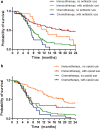The association between gut microbiome affecting concomitant medication and the effectiveness of immunotherapy in patients with stage IV NSCLC
- PMID: 34857829
- PMCID: PMC8640057
- DOI: 10.1038/s41598-021-02598-0
The association between gut microbiome affecting concomitant medication and the effectiveness of immunotherapy in patients with stage IV NSCLC
Abstract
Several observational studies suggested that gut microbiome-affecting-medication impairs the effectiveness of immunotherapy in patients with metastatic non-small-cell lung cancer (NSCLC). We postulated that if the effectiveness of immunotherapy is affected by drug-related changes of the microbiome, a stronger association between the use of co-medication and overall survival (OS) will be observed in patients treated with immunotherapy as compared to patients treated with chemotherapy. In a retrospective matched cohort study, immunotherapy patients were matched (1:1) to patients treated with chemotherapy in the pre immunotherapy era. The association between the use of antibiotics, opioids, proton pump inhibitors, metformin and other antidiabetics on OS was assessed with multivariable cox-regression analyses. Interaction tests were applied to investigate whether the association differs between patients treated with immuno- or chemotherapy. A total of 442 patients were studied. The use of antibiotics was associated with worse OS (adjusted Hazard Ratio (aHR) 1.39, p = 0.02) independent of the type of therapy (chemotherapy or immunotherapy). The use of opioids was also associated with worse OS (aHR 1.33, p = 0.01). The other drugs studied showed no association with OS. Interaction term testing showed no effect modification by immuno- or chemotherapy for the association of antibiotics and opioids with OS. The use of antibiotics and opioids is similarly associated with worse outcomes in both chemotherapy and immunotherapy treated NSCLC patients. This suggests that the association is likely to be a consequence of confounding rather than disturbing the composition of the microbiome.
© 2021. The Author(s).
Conflict of interest statement
The authors declare no competing interests.
Figures
References
-
- Union for International Cancer Control. Non-small cell lung cancer - 2014 Review of Cancer Medicines on the WHO List of Essential Medicines. https://www.who.int/selection_medicines/committees/expert/20/application... (2014)
-
- Rittmeyer A, Barlesi F, Waterkamp D, Park K, Ciardiello F, von Pawel J, et al. Atezolizumab versus docetaxel in patients with previously treated non-small-cell lung cancer (OAK): a phase 3, open-label, multicentre randomised controlled trial. Lancet. 2017;389(10066):255–265. doi: 10.1016/S0140-6736(16)32517-X. - DOI - PMC - PubMed
MeSH terms
Substances
LinkOut - more resources
Full Text Sources
Medical


